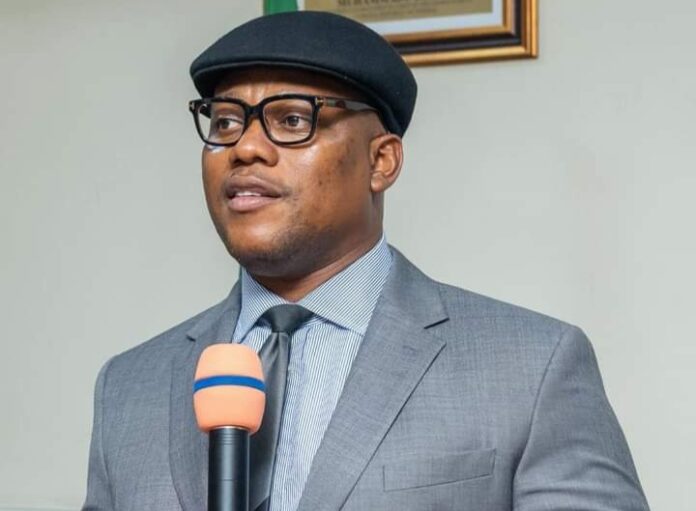Barr Ini Ememobong. (Credit: Facebook- Ministry of Information and Strategy
Abasifreke Effiong
The clichés, “watchdog of the society” and “holding public officers accountable” summarise the role of the press in society. The former describes who a journalist is; the latter spells out his traditional key role. Journalists are watchdogs. They are committed observers of society; critical assessors of public officers; promoters, defenders and preservers of public good; and cornerstones to democracy. Within the ambit of this clichés, the journalist is a professional, critical storyteller. His role in society makes him an ethical critic.
Everyone needs the critical attention of the press depending on which side of the evaluation box its spotlight will tick for you. Often, while mining, milling and distilling his story, the journalist finds interesting twists – little, dark details the newsmaker does not want the public to know – and brings them up before the light of truth. Albeit, those details are necessary to complete the publics’ understanding of the event. Constant exposure of such details has always pitched journalists against the government. Streaming from such exposure is the pervasive atavism and obstinate perception of critical journalists as armchair critics; and their works rated as unethical journalism. Journalists are seen as adversaries, instead of collaborators for development. This trait is found in every society, including my own very small community.
Government-media relations in Akwa Ibom state improved tremendously in the last two years plus of Governor Udom Emmanuel’s second term which ended on May 29, 2023. Previously, the relationship reeked of antagonism, tension, litigations and threats against journalists and their organisations, blacklisting, co-opting, clear-cut inducements, indirect censorship of journalists working for independent media houses, etc. Government’s information managers regularly bombarded journalists with insulting pieces of directives clothed as advice on how to practice. It appeared everyone knew how a journalist should do his job except the journalist. They taxed journalists on facts-checking, accuracy, specificity and sensationalism, but they would not be opened to providing full information to them, even on demand. They would dish out different figures for one budget item and would not seize to wow the public with over-exaggerations and untruths. It was a classic case of the popular, old adage by John Selden, “do as I say, not as I do”. This was not surprising. Didn’t our Saviour, Jesus Christ, tell us about this kind of people authority in Matthew 21:3-5.? He said, “they tell you what to do, but don’t follow their example. For they don’t practice what they teach. They crush people with unbearable religious demands and never lift a finger to ease their burden. Everything they do is for show.” Despite this great hypocrisy, journalists shown constant forbearance.
The appointment of Barr Ini Ememobong, in August 2020 birthed a new era in government – media relations in Akwa Ibom state. Ememobong is not a journalist, but he is familiar with the media industry in the state, having cut his teeth in independent broadcast productions. He is a staunch advocate of press freedom and human rights. His law firm has defended and mediated in defamation cases for journalists. He is a ‘familiar friend who would soon turn enemy’, so we thought when he was appointed Commissioner. His performance as publicity secretary of the PDP, Akwa Ibom state, was exceptional, notwithstanding his habitual use of smearing adjectives in his press releases.
READ: I won’t challenge my defeat ‘despite screaming irregularities’ – Umanah
Gifted in oratory yet scrupulous in telling the truth. As commissioner, Ememobong’s communications were open, timely, warm, temperate and reliable. Telling a lie and intentionally withholding information from journalists ceased under him. He built strong friendship and mutual working relationship with reporters, editors, publishers, broadcast presenters, their Union and professionals associations. He kept regular interactions with them and participated in their events; this created and sustained a bond of professional friendsomeness, cordiality and mutual respect. The friendship birthed mutual trust and useful collaborations. Collaboration with is employer’s ‘adversaries’ became his albatross. Adversarial collaboration is useful. The science concept promoted by Daniel Kahneman et al., defines the coming together of two researchers advocating competing hypotheses to collaborate on a research project as a way of reducing the distorting impact of cognitive-motivational biases, resolving differences and creating mutual satisfaction. The concept was designed on the assumption that it will be more effective to collaborate than allow each researcher conduct their own experiments individually and publishing replies to each others’ papers. The ultimate goal of journalism and governance is a better society. The conflict between the two disciplines lies in the differences in their approach towards meeting this goal. The differences create perceptions and stir up biases, which adversarial collaboration seeks to address. Adversarial collaboration is necessary in effective management of government -media relations. Ememobong made good us of it.
Government relations with the media and other publics got very positive, topnotch reviews under Ememobong. No journalist was hounded, threatened, arrested, detained or imprisoned. This was one of the exceptional reasons the Nigeria Union of Journalists, South South (Zone F) honoured him in May. Two weeks later, the Akwa Ibom state council of the NUJ held a special congress on 23rd and a dinner on 27th May to celebrate his successful end-of-tenure. He was given a memento by the Union as a token of gratitude for his excellent performance. Chairman of the Union, Amos Etuk said the Union convened a special congress to pay tributes to the Commissioner. “We have never done this for any government information manager. This is unprecedented”, Etuk emphasized. The Secretary of NUJ, Dominic Akpan thanked Ememobong for facilitating the employment of 39 youths who have worked in the Akwa Ibom Broadcasting Corporation as artistes (industry register for casual staff) for 10 -15 years. Journalists who spoke at the events had many things to thank Ememobong for. Such praises are unusual from this community of critical assessors.
Ememobong’s ingenuity saved the day when Governor Emmanuel’s administration came up with a restraining order which prevented its appointees from talking to the press. The anti-disclosure policy which sought to control how government information was divulged to the public was capable of creating information blackouts. Working with his team, he came up with brilliant safeguards which ensured that the public’s right to know was safeguarded. Programmes like, “the Governor speaks”, a quarterly live interview with the Governor; post executive council meeting briefings and updates on social media; inter-ministerial briefing, etc, fill the information gaps. The commissioner made himself accessible to journalists and other publics, and was always willing to midwife interviews with heads of MDAs for journalists. He was opened and receptive to ideas. The ministry of information and strategy packaged and produced periodicals like, “Wetin Udom Don Do” (this was translated in three languages – Ibibio, Annang and Oro); “Explore Akwa Ibom”, (a tourism focused magazine), “Impact magazine. It repackaged its daily, live programme on radio called “Update Akwa Ibom” and aired it on 10 stations. Together, these strategies and programmes saved the situation. Although the information control policy made the administration look repressive, Governor Emmanuel later signed the Akwa Ibom State Fiscal Responsibility Law 2022, which grants citizens freedom of access to information.
Ini Ememobong etched his name on diamond as Commissioner for Information and Strategy. He was exceptionally proficient in information management, public relations, perception management, humanness (staff motivation and welfare), talent-spotting, grooming and leadership mentoring. Staff of the Ministry spoke glowingly about his ingenuity; promotion of team work, excellence, staff development and motivation. Some of them recalled that he facilitated the training of information officers on signs and foreign languages, effective succession planning in management and administration, public relations, advance graphics design, data analysis, etc. Under him, middle level management staff of the ministry attended different courses overseas in renowned institutions including the London school of public relations; Elegant professional management and development training institute, Dubai; Administrative staff college, Badagry. Ememobong’s performance was excellent, without doubts.
















